Nur 504 surgery - Study guides, Class notes & Summaries
Looking for the best study guides, study notes and summaries about Nur 504 surgery? On this page you'll find 19 study documents about Nur 504 surgery.
Page 2 out of 19 results
Sort by
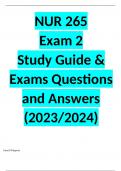
-
NUR 265 Exam 2 Study Guide & Exams Questions and Answers (2023/2024)
- Exam (elaborations) • 30 pages • 2023
-
Available in package deal
-
- $14.49
- + learn more
NUR 265 Exam 2 Study Guide Lungs Physiology ● 2 Pleural, 1 attached to outside of lungs and 1 attached to inside of ribs. ● Space between the 2 pleural is negative to atmosphere ● When inhale becomes more positive and atmosphere more negative. Exhaling is passive ● Most of lower lobes are posterior, must listen to lungs posteriorly ● Breath sounds o Bronchial: High pitched & loud, normal in tracheal & larynx o Bronchovesicular: Moderate pitched & amplitude, normal ove...
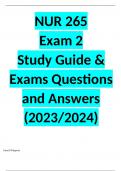
-
NUR 265 Exam 2 Study Guide & Exams Questions and Answers (2023/2024)
- Exam (elaborations) • 30 pages • 2023
-
Available in package deal
-
- $15.49
- + learn more
NUR 265 Exam 2 Study Guide Lungs Physiology ● 2 Pleural, 1 attached to outside of lungs and 1 attached to inside of ribs. ● Space between the 2 pleural is negative to atmosphere ● When inhale becomes more positive and atmosphere more negative. Exhaling is passive ● Most of lower lobes are posterior, must listen to lungs posteriorly ● Breath sounds o Bronchial: High pitched & loud, normal in tracheal & larynx o Bronchovesicular: Moderate pitched & amplitude, normal ove...
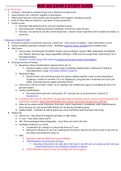
-
Nur 265 Exam 2 Study Guide
- Exam (elaborations) • 23 pages • 2022
-
Available in package deal
-
- $15.49
- + learn more
Lungs Physiology 2 Pleural, 1 attached to outside of lungs and 1 attached to inside of ribs. Space between the 2 pleural is negative to atmosphere When inhale becomes more positive and atmosphere more negative. Exhaling is passive Most of lower lobes are posterior, must listen to lungs posteriorly Breath sounds o Bronchial: High pitched & loud, normal in tracheal & larynx o Bronchovesicular: Moderate pitched & amplitude, normal over major bronchi o Vesicular: Low pitc...
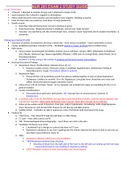
-
NUR 265 EXAM 2 STUDY GUIDE
- Exam (elaborations) • 23 pages • 2022
-
- $4.99
- + learn more
Lungs Physiology 2 Pleural, 1 attached to outside of lungs and 1 attached to inside of ribs. Space between the 2 pleural is negative to atmosphere When inhale becomes more positive and atmosphere more negative. Exhaling is passive Most of lower lobes are posterior, must listen to lungs posteriorly Breath sounds o Bronchial: High pitched & loud, normal in tracheal & larynx o Bronchovesicular: Moderate pitched & amplitude, normal over major bronchi o Vesicular: Low pi...
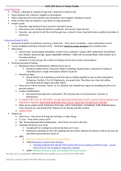
-
NUR 265 Exam 2 Study Guide & Exams Questions and Answers
- Exam (elaborations) • 8 pages • 2022
-
- $11.49
- + learn more
NUR 265 Exam 2 Study Guide & Exams Questions and Answers Lungs Physiology • 2 Pleural, 1 attached to outside of lungs and 1 attached to inside of ribs. ● Space between the 2 pleural is negative to atmosphere ● When inhale becomes more positive and atmosphere more negative. Exhaling is passive ● Most of lower lobes are posterior, must listen to lungs posteriorly ● Breath sounds o Bronchial: High pitched & loud, normal in tracheal & larynx o Broncho-vesicular: Moderate pitched & amplitud...
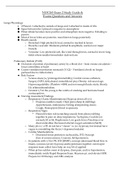
-
NUR 265 Exam 2 Study Guide & Exams Q&A
- Exam (elaborations) • 59 pages • 2022
- Available in package deal
-
- $13.49
- + learn more
NUR 265 Exam 2 Study Guide & Exams Questions and Answers Lungs Physiology 2 Pleural, 1 attached to outside of lungs and 1 attached to inside of ribs. ● Space between the 2 pleural is negative to atmosphere ● When inhale becomes more positive and atmosphere more negative. Exhaling is passive ● Most of lower lobes are posterior, must listen to lungs posteriorly ● Breath sounds o Bronchial: High pitched & loud, normal in tracheal & larynx o Broncho-vesicular: Moderate pitched ...
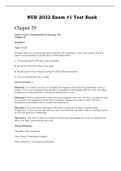
-
NUR 2032 Exam #1 Test Bank Chapter 29 Kozier & Erb’s Fundamentals of Nursing, 10/E
- Exam (elaborations) • 137 pages • 2021
-
- $17.49
- 3x sold
- + learn more
NUR 2032 Exam #1 Test Bank Chapter 29 Kozier & Erb’s Fundamentals of Nursing, 10/E NUR 2032 Exam #1 Test Bank Chapter 29 Kozier & Erb’s Fundamentals of Nursing, 10/E Chapter 29 Question 1 Type: MCSA An older client has an oral temperature reading of 97.2 degrees F. The nurse realizes that this client’s low temperature could be due to which observation? 1. The anxiety level of the client has increased. 2. Hormones have fluctuated in this client. 3. Muscle activity has increas...
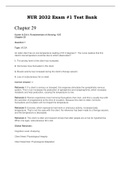
-
NUR 2032 Exam Number 1 Test Bank | Kozier & Erb’s Fundamentals of Nursing, 10/E
- Exam (elaborations) • 137 pages • 2021
-
- $15.49
- + learn more
NUR 2032 Exam #1 Test Bank Chapter 29 Kozier & Erb’s Fundamentals of Nursing, 10/E Chapter 29 Question 1 Type: MCSA An older client has an oral temperature reading of 97.2 degrees F. The nurse realizes that this client’s low temperature could be due to which observation? 1. The anxiety level of the client has increased. 2. Hormones have fluctuated in this client. 3. Muscle activity has increased during the client’s therapy session. 4. Loss of subcutaneous fat is noted. Correct ...
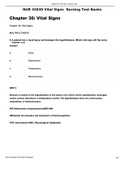
-
NUR 33630 Vital Signs Nursing Test Banks | Chapter 30: Vital Signs
- Exam (elaborations) • 36 pages • 2021
-
- $15.49
- + learn more
NUR 33630 Vital Signs Nursing Test Banks Chapter 30: Vital Signs Chapter 30: Vital Signs MULTIPLE CHOICE 1. A patient has a head injury and damages the hypothalamus. Which vital sign will the nurse monitor most closely? a. Pulse b. Respirations c. Temperature d. Blood pressure ANS: C Disease or trauma to the hypothalamus or the spinal cord, which carries hypothalamic messages, causes serious alterations in temperature control. The hypothalamus does not contr...

Study stress? For sellers on Stuvia, these are actually golden times. KA-CHING! Earn from your study resources too and start uploading now. Discover all about earning on Stuvia


